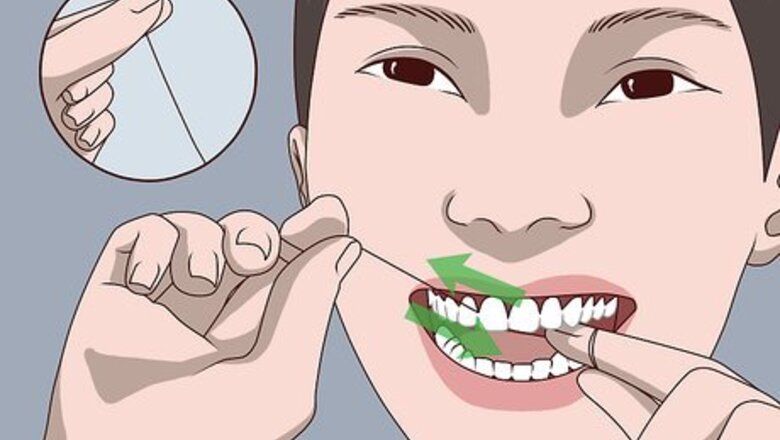
views
Practicing Good Dental Hygiene
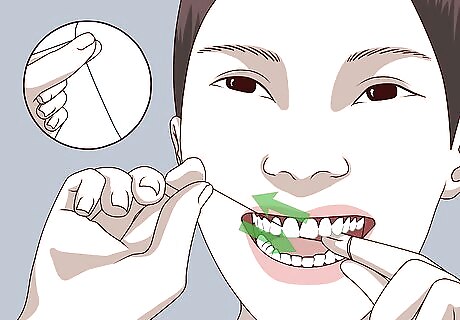
Floss daily between your teeth before brushing to keep them healthy and clean. Grab a short, 12 to 18 in (30 to 46 cm) section of floss and move it back and forth between your teeth. It may help to floss in front of the mirror so you can see which teeth you’ve already flossed. Ideally, floss your teeth before you brush them. You can also use handheld flossers, which consist of a short piece of floss threaded along a plastic tool. Some flossers have a plastic pick on the bottom, which you can use to clean out the gaps between the bottom of your teeth. Flossing keeps your teeth and gums regularly can prevent gum disease, which can lead to future tooth loss.
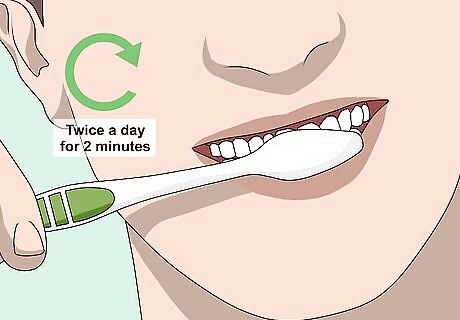
Brush your teeth twice a day for 2 minutes to keep them in great condition. Choose a small or medium toothbrush with soft bristles so you can comfortably brush your teeth without agitating your gums. Try to get in the habit of brushing your teeth when you wake up and before you go to bed, or after you eat. Hold your brush at a 45-degree angle and brush all sides of your teeth, along with your tongue. If you brush your teeth on a regular basis, your teeth won’t be as likely to fall out. Brushing your teeth helps prevent cavities and plaque build-up, which can eventually lead to tooth loss.Tip: You can also boost your oral health and protect your teeth by using mouthwash on a daily basis.
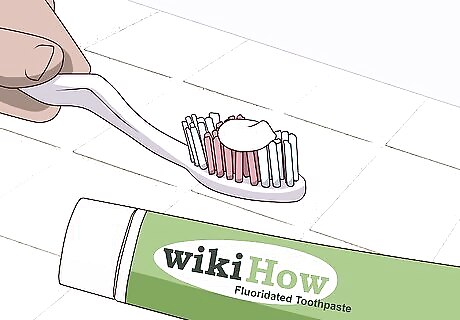
Use a pea-sized amount of fluoridated toothpaste each time you brush. Look for a tube of toothpaste that includes fluoride, a nourishing dental supplement, as an ingredient. You can also use toothpastes with other added benefits, like tartar control. Generally, you only need to use a pea-sized amount of toothpaste each time you brush your teeth. There are a lot of different toothpaste varieties out there, including some that are designed for sensitive teeth. Fluoridated toothpaste helps keep your teeth healthy and strong, and may make you less prone to tooth loss.
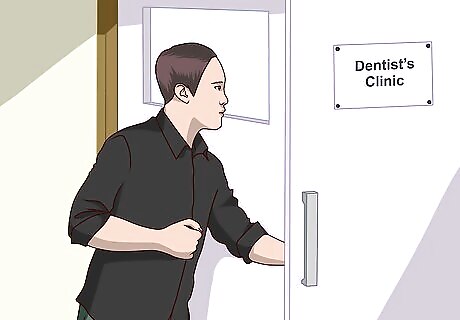
Visit your dentist twice a year for a more in-depth cleaning. Call your local dentist’s office and see if you can schedule a regular cleaning. Unlike other doctor appointments, try to get your teeth examined and cleaned around twice a year, so your dentist can check for cavities and any other problems. If you aren’t sure when you last visited your dentist, call the office to schedule an appointment or double-check when your next appointment is. Dentists and hygienists can give your teeth a thorough cleaning, which gets rid of harmful plaque build-up that can eventually lead to tooth loss.
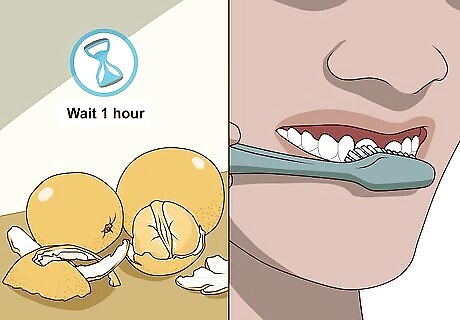
Wait 1 hour to brush your teeth after eating acidic foods so your saliva can do its job. Snacks with a lot of acid, like orange slices, can slowly erode away at your teeth—thankfully, your saliva cleans away a lot of these acids on its own. Give your mouth time to recuperate and take care of itself before you brush your teeth.
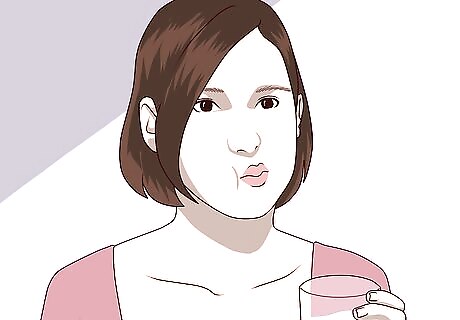
Rinse out your mouth after eating to get rid of food particles in your teeth. Swish a sip of water around your mouth and through your teeth to get rid of any leftover food that’s stuck in your mouth. This prevents plaque from forming, which isn’t good for your teeth. You can also rinse out with an antibacterial mouthwash or a stick of sugar-free gum, if you want.
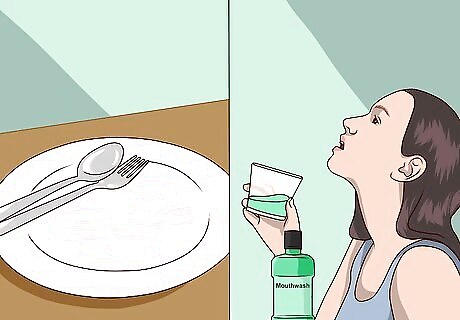
Swish antibacterial mouthwash in your mouth after lunch. Follow the instructions and recommendations and clean your mouth with a swish of mouthwash. This product helps make your breath fresher, and can help you spit out any loose bits of plaque. Don’t use mouthwash right after you brush your teeth, as this may wash away some of the fluoride from your toothpaste. Instead, use mouthwash in the middle of the day, around lunchtime. Mouthwash can cause dry mouth, so you may not want to use it on a daily basis.
Changing Your Diet
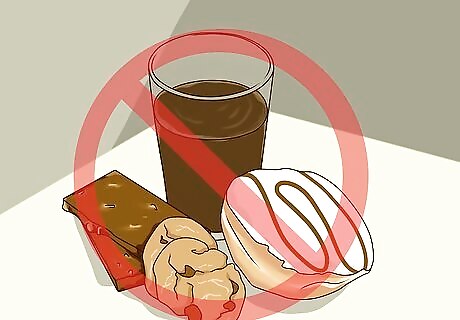
Cut back on enjoying sugary snacks and drinks to prevent tooth decay. Think about how much sugary or acidic food you eat and drink on a regular basis. If you enjoy a lot of foods and drinks that aren’t great for your teeth, consider making the switch to something a bit healthier. For instance, if you drink soda a lot, switch to less acidic juice, like apple juice. If you enjoy citrusy foods and drinks, try switching to less acidic foods, like carrot sticks. Keep in mind that sour candy is extremely acidic, which isn’t good for teeth. Cutting back on this candy can keep your teeth a lot healthier and prevent them from falling out in the long run.
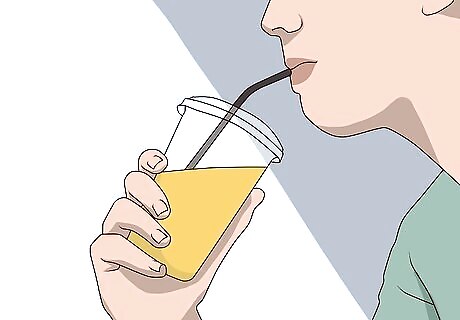
Enjoy your sugary drinks quickly with a straw so sugar doesn’t touch your teeth. Don’t give your drinks extended time to hover around and damage your teeth. Instead, drink them through a straw so they touch your teeth as little as possible. While you don’t have to chug your drink, don’t sip on it for an entire afternoon. Using a straw prevents sugary or acidic damage to your teeth, which can prevent tooth loss overall.
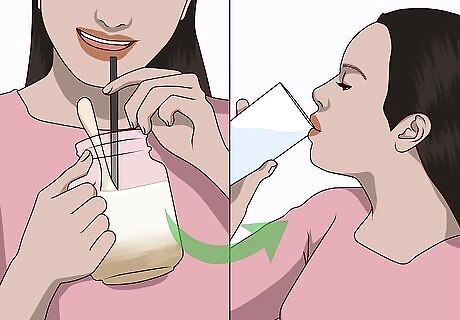
Drink water after having a sweet or acidic beverage to dilute the drink. Wash out some of the leftover sugar in your mouth by enjoying a glass of regular water. As an extra boost, drink fluoridated water to give your teeth some extra protection. Sugar and acid can damage your teeth over time, so diluting Andy residue can help prevent tooth loss later on. Try to get in the habit of drinking water after any sweetened drink, whether it’s tea, coffee, lemonade, or soda.
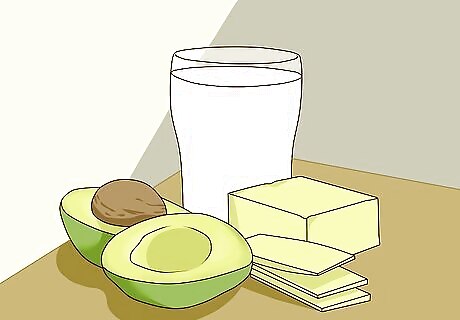
Boost your diet with a lot of calcium-rich foods and drinks. Add milk and cheese to your diet, along with other calcium-rich items. Calcium helps keep your teeth healthy and strong, which can protect you from tooth loss.
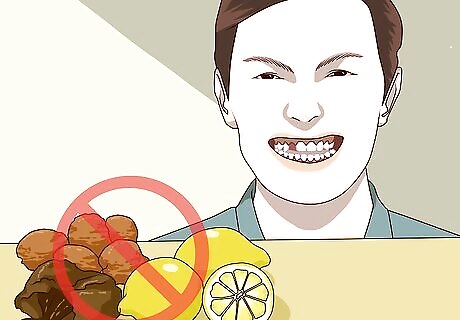
Avoid crunchy and overly sweet or acidic foods if your teeth are already loose. Cut back on any hard, crunchy foods that you enjoy from time to time, like potato chips or ice cubes. Additionally, limit any sugary drinks that you enjoy a lot, like sports drinks and soda. Citrusy foods and sticky snacks, like candy, can also lead to a lot of long-term damage. Ice cubes can damage your enamel over time, while crunchy, starchy foods can lead to excessive plaque.
Making Lifestyle Changes
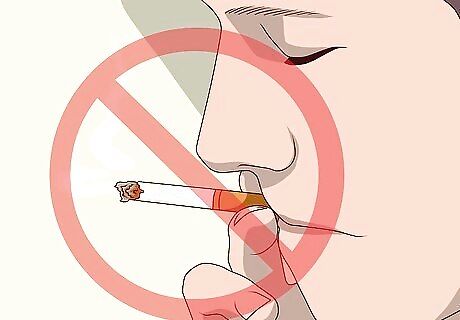
Quit smoking if you’re a smoker. Use patches, gum, and other helpful treatments that help lower your addiction to nicotine. Visit your doctor and talk about steps you can take to quit smoking entirely. Cigarettes have a lot of foreign, yucky chemicals in them that can cause a lot of dental damage, and possibly tooth loss. Quitting smoking also provides you countless other health benefits, like lowering your risk of stroke and cancer.
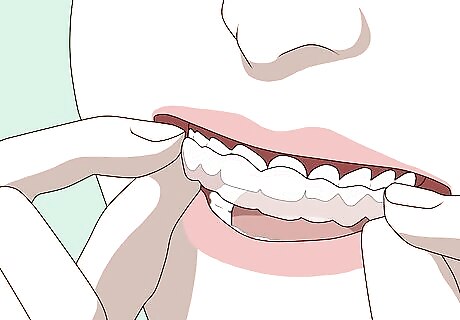
Stop grinding your teeth while you sleep. Wear a night guard when you go to bed, or develop a relaxing, pre-bedtime routine that makes you less likely to feel tense while you’re in bed. Simple things like exercise and massage can help soothe your nerves and prevent teeth grinding, which can cause a lot of damage. Alcohol and caffeine can also play a negative role in your tooth grinding, so you may want to avoid drinking these before bed.Did You Know? Teeth grinding can also happen during the day, especially if you drink a lot of caffeine. Cut back on your favorite caffeinated drinks, which can help keep your teeth intact.
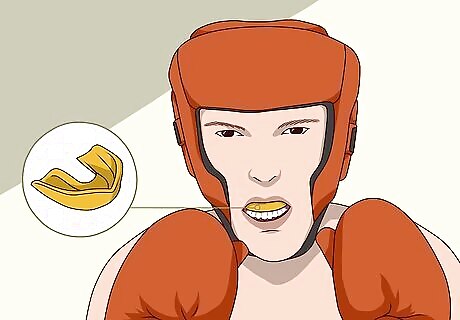
Wear a mouthguard whenever you play extreme sports. Follow the provided instructions with your mouthguard so it fits securely around your teeth. In high-contact sports like boxing or hockey, there’s a risk of your teeth falling out by force, which is greatly prevented with a mouthguard. You can find mouthguards online or at most sporting goods stores.
Seeking Dental Care
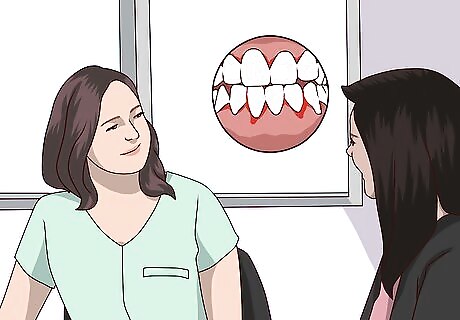
Talk to your dentist if your gums are bleeding a lot or look inflamed. Watch for signs of gum disease in your mouth, like swollen or bleeding gums, or an especially dry mouth. Your dentist can point you in the right direction and recommend a healthy treatment plan. Bring up any other symptoms you’ve experienced, even if they seem insignificant.
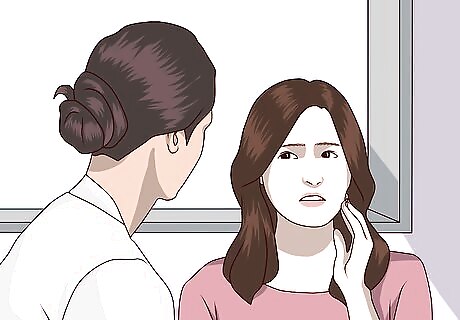
Speak with your doctor or dentist if you have diabetes along with dental issues. Diabetes can cause some complications in your dental health, and put you at greater risk for diseases that cause tooth loss, like early and advanced gum disease. You and your dentist can keep an eye on your oral health so you can take action right away, if necessary.
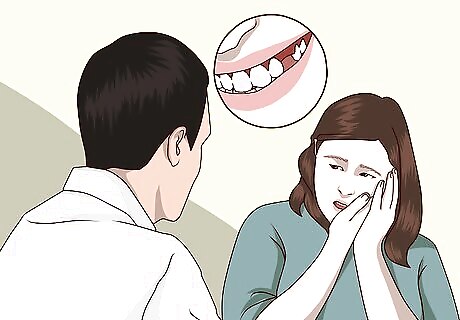
Visit the dentist immediately if you get your tooth knocked out. If your tooth gets knocked out, grab the loose tooth by the chewing portion, clean it off, and put it back in your mouth. Visit a dentist or oral surgeon within 30 minutes so the tooth can be repaired. Knocked-out teeth can be out of the mouth for up to an hour.

Talk to your dentist about implants, bridges, or other procedures. If your teeth are really loose or on the verge of falling out, your dentist may be able to recommend a few procedures that can fix your problem. Unfortunately, these procedures can be a bit pricey, though they may be covered by some dental insurance. For instance, an implant is drilled into your jaw to replace a single tooth, while a bridge uses 2 adjoining crowns to replace a lost tooth.



















Comments
0 comment